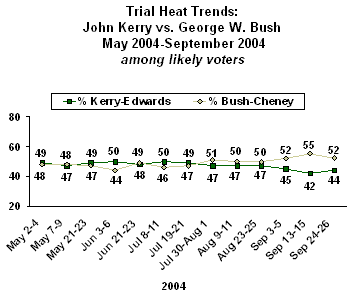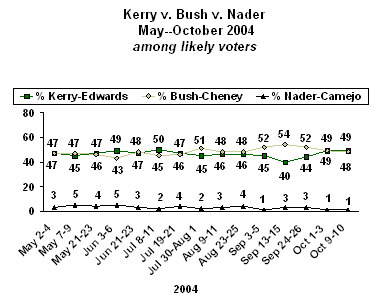
Monday, September 8, 2008
Don't Panic - 10 Reasons Why Obama Supporters Should Chill
 After the Democratic National Convention, the mood was exultant among Democrats and others who want to see Barack Obama win the election. The convention did well to unite Democrats, and Obama capped it off with a rousing speech before a huge crowd. He got a boost in the polls, and his supporters felt confident.
After the Democratic National Convention, the mood was exultant among Democrats and others who want to see Barack Obama win the election. The convention did well to unite Democrats, and Obama capped it off with a rousing speech before a huge crowd. He got a boost in the polls, and his supporters felt confident.Then came John McCain’s announcement of the Sarah Palin pick, followed by the Republican National Convention. Democrats got to see that Republicans, too, can get excited and energized. McCain whittled away at Obama’s lead in the national tracking polls, and has now even pulled ahead in a couple of them.
Democrats are starting to get worried. No, actually, some have gone well beyond that – they are freaking out. I hear the same refrains in so many quarters: Why is Obama behind McCain? Has the election changed with the Palin pick? Why isn’t Obama winning easily in this Democrat-favored race? Is his message not getting across? Why is he so soft on the opposition, instead of fighting back? Why don’t we counter the McCain attack ads with some of our own? We need to do something!!
Indeed, we do. We need to calm down.
Unrealistic Expectations
First of all, some Democrats seriously need a dose of reality in terms of how they thought this election would play out. Too many thought it would be a cakewalk, because they had an exciting new, young candidate and the national mood was sour on Bush and the Republicans. How could they lose with such an inspiring leader, in a country yearning for change?
The answer is simple: not everyone wants change, and even among those who want it, some don’t trust Obama to deliver it. Obama himself knows this – he’s said from the start that this would not be a landslide, it would be a tough, close campaign. And as in so many other cases, he’s proven that he knows what he’s talking about.
Polls are glimpses into the state of the election, so it is natural to worry when they seem to turn against you. And it’s also perfectly normal, when you feel attacked, to want to respond with attacks of your own. But let me remind you that this sort of emotional “we need to do something” attitude in response to an attack is a big part of what got us into the morass known as the Iraq War. How well did that work out?
In that context, let me give you ten reasons why you should chill out and not worry so much about the polls and all the other daily ups and downs and noise.
1. National Tracking Polls are Deceptive
Organizations like Gallup put out daily polls purporting to show the state of the race, but these are tracking polls conducted on a nation-wide basis. Our election is not a simple popular vote taken across the country – it is based on state-by-state contests. While movements in national tracking polls certainly matter, being behind in one of these polls doesn’t necessarily mean the one trailing is losing the election.
Consider the Palin pick and the response to it. While certainly the McCain ticket has benefited nationally, does that mean it has actually moved any states? We don’t know yet, as there have been no state polls since the conventions. Remember: it doesn’t matter if Palin energizes a bunch of hard-right conservatives so that McCain wins a state like Texas by 20 points instead of 10: the number of electoral college votes is identical. All that really matters is the swing states.
2. Convention Bounces are Normal and Expected
Most candidates get a noticeable “bounce” in the polls after their conventions: Obama got one a week ago and McCain is getting his now. Why does this happen? Simple: each convention allows one candidate to get a huge amount of free propaganda time without rebuttal from his or her opponent. This happens in almost every year.
The fact that McCain moved ahead of Obama after his convention doesn’t mean Obama is in trouble. If McCain had not moved ahead of Obama, that would have meant McCain was in trouble.
This year, matters are even more complicated, because the conventions were back-to-back. All of the polling data is suspect until enough time elapses for the bounces to settle down.
3. Bounces Fade
Remember when Obama went on his “magical mystery tour” to Europe and the Middle East? He shot out to a 49%-40% lead over McCain in the Gallup tracking poll on July 27th. But by July 31st, just four days later, the race was back to 45%-44%.
Consider this graphic from Gallup during the 2004 election, showing the situation in late September:
 (Source: Gallup.com)
(Source: Gallup.com)Looks pretty bad for Kerry, doesn’t it? Bush moved out to a 13-point lead and even two weeks after his convention, Bush was still up by 8.
Now, here’s the same poll two weeks later:
 (Source: Gallup.com)
(Source: Gallup.com)That's Kerry who was up 49%-48% there, by the way. Yes, Kerry eventually lost, but by a small margin. Trailing in the polls by big numbers in September didn’t matter – it was just noise.
4. Sarah Palin is the “Flavor of the Week”
McCain and the Republicans seem to think they’ve scored a home run with the Sarah Palin pick. She’s excited “the base” and gotten a lot of attention. She’s all over the media: she’s being discussed on talk shows, she’s the focus of political pundits, and will soon be splashed all over the supermarket checkout aisle as well.
Does this strike you as ironic coming from a guy who made an issue of Obama’s “celebrity” all summer? Indeed, but remember that this also means that McCain and Palin get the flipside. Remember when Obama started to receive criticism for getting too much media exposure and voters started to experience “Obama burnout”? The exact same thing will happen here.
Sarah Palin is the media darling right now, but that never lasts. The more popular she gets, the more people will expect her to give honest answers about her many scandals and problems. And eventually, the short attention span of Americans will turn to something more interesting, the Palin circus will fold up its Big Top, and then we’ll be back to more important matters: the issues that John McCain thinks voters don’t care about.
5. This is the Fifth Inning, not the Ninth
Some people seem to forget that we are barely a week past Labor Day, not approaching Halloween. The bulk of the campaign is still ahead of us, including all of the debates. Simply put, not enough has happened yet to start worrying that either Obama is “in trouble” or “running out of time”.
6. Obama’s Campaign Approach Works
Obama has built up his candidacy and his campaign from scratch with a new approach unlike any other in recent American history. It is based on a focus on the issues, a high road respect for the opposition, and a relentless message that the election should be about helping the American people deal with serious problems, not about who was a POW 40 years ago or who can skin a moose.
It might be satisfying to think of Obama going to town on McCain and Palin and ripping them to shreds, but it would probably be a big mistake. It would undercut his entire message and it would reek of desperation. And what’s worse, it wouldn’t likely help him a bit.
The McCain/Palin ticket is trying to ignite a culture war of right versus left, rural versus urban, and yes, to some extent, white versus black. After 18 months of a noble, issue-focused campaign, Obama cannot expect that he can now jump into the pig sty and beat the pigs at their own game. It won’t work because it’s not how he operates.
He needs to stay on message, as he has all along: this is not about right versus left, it’s about the future and what’s best for American families.
7. Presidential Campaigns are Like Icebergs
As voters, our information is extremely limited: we only see the part of the iceberg above the water line. The campaigns themselves know much, much more about what is really going on at the ground level, and on a state by state basis, because they have their own networks, internal polling and other data we never see. For example, when McCain picked Palin he surprised a lot of people because at that time the race seemed very close. It is widely theorized that he made his “Hail Mary” pass because his own people knew things were going far worse than it appeared on the surface.
I don’t believe in blind faith, but I do have faith that if the sun rose in the east every day until now, it probably will tomorrow as well. Remember that a year ago, people considered Hillary Clinton so much a shoo-in for the Democratic nod that people mused that she was practically an incumbent. Millions laughed at the notion that the skinny black kid from Chicago could tackle the Clinton Machine and win. They aren’t laughing now.
So while I understand and share some of your concerns over Obama’s relatively “soft” approach, his team has earned some benefit of the doubt.
8. Obama’s “Ground Game” is Unprecedented
One key aspect of the “iceberg” issue is that we see polls and ads and stories in the media, but we do not see the “ground game”. This term refers to state-based field offices, volunteer forces and other efforts to register new voters, keep enthusiasm high, and encourage them to actually get out and vote on November 4th.
Obama’s people have made this part of the campaign a huge priority, because this is what it is really all about: votes. Consider some recent figures from the Swing State Project, showing the following changes in voter registration in some key states:
- Colorado: Went from a 165,423 registration advantage for Republicans in 2006, to only 78,227 so far in 2008.
- Florida: From a 283,856 Democratic advantage to a 465,617 advantage.
- Iowa: From an 18,195 Democratic advantage to a 99,014 advantage.
- Nevada: From 15,309 Democratic to 76,053.
- Pennsylvania: From 599,791 Democratic to 1,111,900!
9. Invisible Voters Don’t Get Polled
Continuing again on the “iceberg” theme, remember that polls are based on statistical models that project what will happen in this election from what has happened in prior years. By their very nature, then, they tend to lag behind and be unresponsive to new trends.
Consider some of the areas where Obama is running huge leads over McCain: young people, Internet users, urban professionals who use cell phones, new immigrants, and all those new voters I mentioned just above. These are all historically under-represented in polls.
10. Campaigns Hold Good Stuff Back
An important part of a good campaign is timing: you have to play your cards when they will have the most effect. You don’t just throw everything you have out there at once, because it all gets jumbled together and it fades from public view too quickly.
As just one example, it is widely theorized that General Colin Powell may – note that word please – endorse Barack Obama. If true, Obama will ask Powell to wait to make that announcement at a time when it will be of maximum benefit to his campaign.
Similarly, by not panicking now, Obama also holds in reserve any potential “Hail Mary” pass of his own. Obama is principled, but he’s no fool, and the Democratic leadership knows what’s at stake here. If Obama really does get to the point where he feels like he is going to lose, he can shake things up any time from now until shortly before the election – there’s no rush.
--
Chill Out
I hope this article has made you feel a bit better about the current state of affairs. If you’re still worried, don’t sit around biting your fingernails to a stump – do something productive! Send a donation, volunteer to make some phone calls, or heck, start a blog. Anything constructive you do will not only help you achieve what you want – an Obama/Biden victory in November – it will make you feel much better at the same time.
Keep your wits about you, folks – there’s still a long road ahead of us, and much work to be done.

Last week, Virginia’s Montgomery County, home to Virginia Tech, issued a press release regarding proper protocol for college students registering to vote. In interviews with Inside Higher Ed Tuesday, it was described by turns as “unsubstantiated,” “chilling,” and (more generously) as not “incredibly encouraging or friendly.” Read more…



No comments:
Post a Comment